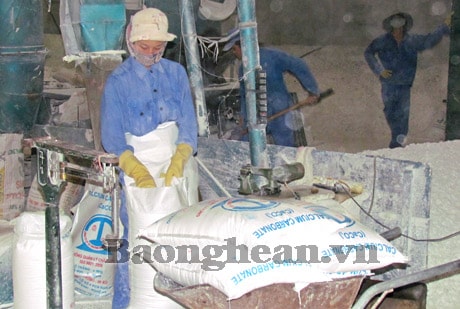Vinh City: Many mechanisms to support cooperative development
(Baonghean) -In Vinh City, there are 49 cooperatives, including 24 agricultural cooperatives and 25 non-agricultural cooperatives. According to the city's assessment, there are 8 good cooperatives, 12 fairly good cooperatives, 20 average cooperatives and 9 weak cooperatives. In recent years, the city has had many policies and mechanisms to promote the development of cooperative economy. However, with a low starting point and limited capacity, the cooperative sector still faces many difficulties in the market mechanism...
For transport cooperatives such as Nghe An Passenger Transport Cooperative and Binh Minh Transport Cooperative, it is even more difficult due to the competitive pressure of a series of transport units established with high-quality vehicles. In addition, the adjusted increase in gasoline prices has put pressure on ticket prices, making it difficult to attract passengers.
Mr. Phan Huu Man - Chairman of Binh Minh Transport Cooperative, shared: Before 2008, the transport cooperative's operations were still "easy", at that time the cooperative had about 180 vehicles running intra-provincial and inter-provincial routes, bringing in significant revenue. In recent years, passenger transport activities have become more and more difficult, the supply of means of transport is in excess, while the travel demand of passengers has not increased. Recently, although the price of gasoline has been adjusted to increase, the cooperative has not adjusted the ticket price to compete to attract customers. Under many competitive pressures, many routes are operating inefficiently and are forced to sell vehicles, up to now the cooperative only has 134 vehicles. The most difficult thing is that the intra-provincial routes such as Vinh - Do Luong, Vinh - Thanh Chuong, Vinh - Quynh Luu, all have to sell vehicles because of losses, unable to compete with buses. In 2009, all 3 routes had 37 vehicles running, now they have had to sell 2/3 of the vehicles, only 12 vehicles left.
With its main business being flag embroidery, artistic embroidery, festival costumes, etc., Thong Nhat Embroidery Cooperative is facing a series of difficulties. “We only sold about 30 artistic embroidery paintings throughout the year, and the number of flags sold has also decreased sharply. Due to difficulties, agencies and businesses have cut spending, limited the organization of festivals and decorations,” said Ms. Nguyen Thi Thuy - Head of Thong Nhat Cooperative.
Cooperatives that want to survive and develop in the current period require a production and business plan that can be implemented effectively and create trust for members to contribute capital. This is a very difficult problem for the Board of Directors of Cooperatives. To solve this problem, the city has assigned responsibility to relevant departments to guide the Board of Directors of Cooperatives on specific contents: especially the selection of product plans based on the needs, conditions, and advantages of the Cooperative; procedures for land, production management organization, and effective accounting.
Up to now, 45/49 cooperatives have developed production and business plans, of which 17 projects have been put into production, 16 projects are being completed and supplemented, and 12 projects are not feasible. There are 34 cooperatives from purely agricultural, small-scale, fragmented production, now have plans to expand production in many fields such as restaurant business, construction materials production, handicraft production, animal feed services, cultivation, aquaculture, internal credit... and some cooperation and investment plans have appeared, initially stable such as Quyet Thanh, Thanh Do, Hung Hoa 2, Phong Phu Cooperatives...

Production of white stone powder at Quyet Thanh Cooperative (Nghi Phu Small Industrial Park).
Talking to us, the leader of the Economic Department of Vinh City People's Committee said: The growth rate of cooperatives is not only low but also tends to decrease over a long period of time, the potential of cooperatives is also weak and low efficiency. Typically, the capital growth rate is low and unstable. The growth rate of added value of the collective economic sector in the period of 2006-2012 only reached an average of 4.13%, far lower than the average growth rate of the city: 15.7%, and of the private economic sector: 15.2%. The scale of cooperatives is still small, the operating efficiency is low, lasting for many years.
The mobilization of capital contributions from members is still limited, the capital of cooperatives is small, and is mainly invested in fixed assets, so there is a lack of working capital, and the ability to preserve is still low. Many cooperatives are facing outdated technology and equipment, low management skills, low production and business results, and no savings. Employment and labor for cooperatives are unstable and seasonal. Some non-agricultural cooperatives still rely mainly on land and kiosk rental sources.
The City People's Committee has issued a training mechanism to encourage and attract young, enthusiastic, dynamic and secure staff to work long-term for cooperatives to form a team of cooperative management staff in the future. The city budget supports additional income for university and college staff to work at cooperatives in the first year. Support the budget for training university staff of cooperatives from local sources. Every year, through the industrial and agricultural promotion plan, the Social Policy Bank, many cooperatives and members have been supported with loans to invest in production equipment, vocational training for workers, investment in technological innovation, application of economic and technical advances in production. Study tours, building models in agricultural production and aquaculture... In particular, in 2008, the city established a Cooperative Development Support Fund. After 4 years of implementation, support was disbursed with an amount of 5.7 billion VND to 9 cooperatives with 12 loan projects. In addition, the state budget has supported billions of dong for farmers to restore production caused by natural disasters and epidemics.






